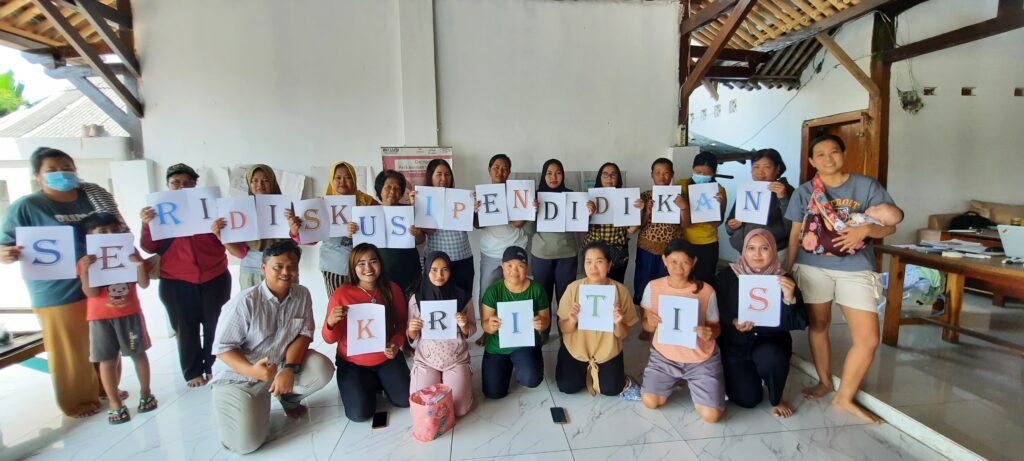On Thursday, July 11, 2024, a critical education discussion was held for Benteng Chinese women with the theme “Building an Understanding of Violence.” This discussion was part of Module 3, Session 7, which focused on understanding violence, forms of violence, and the cycle of violence. This event was attended by 20 female administrators and cadres of KWPS Lampion Merah Abadi. The discussion took place at the house of the Head of RW 01, Mr. Cuan Hoy, in Belimbing Village.
The discussion facilitators were Mr. Yusti Ekoputro and Mrs. Octa Famelia from PPSW Jakarta. The purpose of this discussion is to understand the concept of violence, forms of violence and the cycle of violence. By understanding this material, it is hoped that participants can reduce or avoid all forms of threats of violence against women and children. As well as encouraging community participation in efforts to protect victims of violence.
The training was opened by inviting participants to stand in a circle. The facilitator explained the purpose and method of the discussion session by inviting participants to play “Counting” to warm up the atmosphere. In this game, participants are divided into two lines. The facilitator randomly appoints one participant to mention numbers in sequence from 1 to 9. Meanwhile, participants who get the number 10 must mention another number below that number. Participants who are late or incorrectly mention the number are asked to leave the line. The game is repeated several times until it is clear which line has the fewest numbers.
The facilitator said that throughout 2023, Indonesia was hit by various news related to cases of violence against women and children. The National Commission on Violence Against Women noted in its 2023 Annual Report (CATAHU) that there were 401,975 cases of violence throughout the year. This figure shows that violence is a serious problem that requires attention and contribution from all parties in efforts to prevent it.
Violence is all forms of behavior, both verbal and non-verbal, carried out by a person or group of people in a coercive, one-way manner, and without bargaining so that it causes negative or detrimental impacts on the person being targeted. Forms of violence include: physical violence is an act that results in pain, illness, or serious injury. Such as hitting, slapping, kicking, pinching, strangling, or being doused with hot water.
Meanwhile, mental-based violence is an act that results in fear, loss of self-confidence, loss of ability to act, a sense of helplessness, and/or severe psychological suffering such as intimidation, threats, bullying, and harsh words. Then, what is called sexual violence is the coercion of sexual intercourse through threats, intimidation, or other means that are not desired by the victim. Finally, there is also neglect. Namely, the act of illegally releasing responsibility for children and descendants, which often occurs due to economic factors.
“I experienced violence since I was little, my father was often angry and liked to beat my mother. After having a husband, I also experienced the same thing. My husband was sweet at the beginning of our marriage, but after the first child was born, my husband often came home late and didn't even come home. I earn my own money for the children.
"So far I have resigned myself to the situation. Now I know and realize that I am experiencing violence. I now dare to tell my husband to help me sell cakes when I have meetings at the cooperative. My husband is now starting to change and help me. My husband started to respect me and is willing to take my children to school. After I became active in the cooperative, I began to be seen and respected by my husband and the community," said Lanny, one of the discussion participants.
Ms. Lanny's story shows that with proper support and understanding, victims of violence can take steps to change their situation and gain the respect they deserve.


